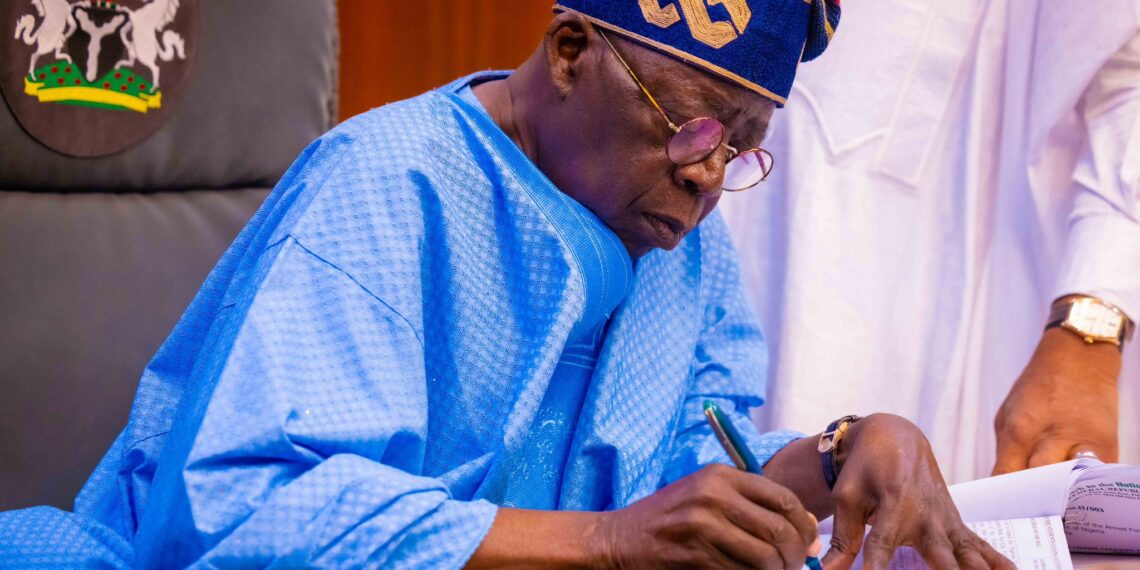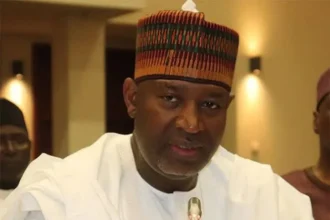...To get all news updates, Join our WhatsApp Group (Click Here)
Also Join our WhatsApp Channel (Click Here)
As Nigeria’s premier anti-corruption agency, the Economic and Financial Crimes Commission (EFCC) motivates the anti-corruption war of the President Bola Ahmed Tinubu-led federal government. With the corruption fight as a pillar of the Renewed Hope Agenda of President Tinubu, the government in the past one year has been remarkable as one that chose to do away with media hype and rhetorics in its anti-corruption programme, preferring rather that the outcomes bear the testimonies.
The federal government’s prioritisation of the fight against corruption gives evidence to President Tinubu’s good understanding of the damage corruption has inflicted on the health of the national economy and wellbeing of the citizens.
On 21 December, 2023, Lateef Fagbemi (SAN), the attorney general and minister of Justice, while speaking at an EFCC event in Ilorin, made a public declaration of the rule of engagement of the Tinubu government through the Commission.
“Let me state in unequivocal terms that the EFCC is pivotal in the Tinubu administration’s plan to remove impediments to accountability in governance institutions and strengthen mechanisms and platforms by which Nigerians can hold public officers to account. To this end, the government is prepared to support the Commission in whatever way possible to deliver on its mandate. The recovery and repatriation of Nigeria’s stolen wealth is an issue of great concern to the administration and the EFCC is expected to continue to lead the charge to trace, recover and facilitate the return of our stolen wealth,” he said.
The Tinubu government’s war against corruption bear testament to a renewed vigour in the EFCC under the leadership of Ola Olukoyede. The chairman was appointed on 12 October, 2023. His subsequent confirmation by the Senate, six days after, on 18 October, 2023, added impetus to his will to drive the Commission with single-mindedness in confronting the monster of corruption in the country.
In the period covering 29 May, 2023 to 29 May 29, 2024, the Commission secured a pace-setting 3,175 convictions (three thousand, one hundred and seventy-five ) and recovered N156,276,691,242.30 (One hundred and fifty-six billion, two hundred and seventy-six million, six hundred and ninety-one thousand, two hundred and forty-two naira, thirty kobo).
In other currencies, the Commission made recoveries of $43,835,214.24; £25,365.00; €186,947.10; ₹51,360.00; C$3,750.00; A$740.00; ¥74,754.00; R35,000.00; 42,390.00 UAE Dirhams; 247.00 Riyals and 21,580, 867631 crypto currencies.
Olukoyede prioritised fraud prevention as an anti-corruption mechanism within his first 100 days in office. This saw the Commission’s reintroduction of Inter-faith Manual for Christian and Islamic faiths, which was launched in a national event in Yar’Adua Centre, Abuja on 31 January, 2023, themed, “Youth, Religion and the Fight against Corruption.” The manual provides anti-corruption, economic and financial crimes doctrinal guide for clergies in both faiths for inculcation into the faithful.
The launch was further optimised for a campaign against youths’ involvement in cybercrime. For this, vice chancellors of Nigerian universities and provosts of other tertiary institutions were drawn out for the occasion. Religious and traditional leaders, heads of ministries, departments and agencies (MDAs) of government, youth groups, varied civil society tendencies and Federal Government delegates, also participated fully.
Another aspect of fraud prevention mechanism which the Commission has brought into the mix within the one year period of the Tinubu government is the Fraud Risk Assessment and Control (FRAC) for the MDAs, which was conceived to prevent occurrence of fraud in these departments of government. FRAC is a template on corruption and fraud prevention in MDAs which have been rendered hugely vulnerable to resource haemorrhage and endless conduits for public funds theft with attendant negative impact on the nation’s development.
Further in pursuit of the fraud prevention mechanism, the EFCC under the current leadership has made FRAC a full- fledged department, which is saddled with the responsibility of examining systemic challenges that allow corruption to fester in the country. The new Department will implement all aspects of the Commission’s Corruption Prevention Strategy that requires risk-based approaches.
As Olukoyede has stated: “The recalibration of the Commission’s prevention strategy seeks to promote proactive deterrence and greater inclusivity in terms of participation of all stakeholders. Our motivation is to see how corruption, whether in ministries and agencies of government, in the ivory towers, or the private sector, could be prevented before it occurs.”
More than ever before, the Commission has shown commitment to the enforcement of extant laws relevant for the reflation and stimulation of the economy. On 7 February, Olukoyede inaugurated a Special Task Force in all the Commission’s 14 Zonal Commands and the headquarters for the enforcement of laws against currency mutilation and dollarisation of the economy. In broader terms, the Special Task Force sees to the protection of the economy from abuses, leakages, foreign exchange distortions and exposure to instability and disruptions. Since its inauguration, arrests and convictions on the grounds of currency racketeering and illegitimate operation of banking services come thick and fast.
The Commission has applied robust enforcement actions essential for instilling integrity and stability in the forex market, deterring currency speculation and safeguarding the interests of investors and the public. The Commission’s crackdown on forex racketeers saw to a 24 April order of the Federal High Court, Abuja, that froze 1,146 bank accounts belonging to individuals and companies on account of alleged money laundering, unauthorised dealing in foreign exchange, and illegal currency manipulation. The Commission is currently prosecuting individuals and companies found complicit.
Owners of business entities, private universities, other institutions of higher learning and retail outlets which charge fees or costs in dollars have also been brought into line by the Commission.
Under President Tinubu, the EFCC has left no one in doubt that a new era that recognises no sacred cows has dawned in the anti-corruption fight. The free hand that the President gave the Commission to take on any case of corruption was the oxygen the EFCC sorely needed for reinvigoration of it activities. Over the course of the last few months, the files of 13 Nigerian former governors and dozens of ministers have been reopened with many of them already drawn back into Commission’s dragnet. Olu Agunloye, a former minister under Obasanjo has been charged to court for his alleged role in the $6 billion power sector fraud.
Godwin Emefiele, a former CBN governor, is facing multiple prosecution, on multiple charges of suspected acts of official corruption and money laundering. On 24 May, Justice Yellim Bogoro of the Federal High Court, sitting in Ikoyi, Lagos, gave an interim forfeiture order on $4,719,054, N830,875,611 and a number of properties linked to Emefiele. The judge gave the order, following a motion ex parte filed by the Commission.
Halima Shehu, the Chief Executive Officer (CEO) of the National Social Investment Programme Agency (NSIPA) was suspended by President Tinubu following the Commission’s exposure of N44 billion stolen from the Agency between 27 and 31 December, 2023.
Betta Edu, the minister of Humanitarian Affairs and Disaster Management has also been suspended by the President since January on the strength of EFCC’s findings. Sadiya Umar Farouk, the ex-Humanitarian Affairs minister is currently under investigation over an alleged N37.1 billion fraud.
Discreet investigations by the EFCC have also exposed fraudulent dealings involving COVID-19 funds, World Bank loans and the recovered Abacha loot, released to the Ministry of Humanitarian Affairs and Disaster Management by the Federal Government to execute its poverty alleviation programme.
So far, a combined total of N32.7 billion and $445,000 have been recovered from the Ministry of Humanitarian Affairs and Disaster Management.
Similarly, President Bola Tinubu in March 2024 suspended indefinitely from office, the Managing Director/Chief Executive Officer of the Rural Electrification Agency (REA), Ahmad Salihijo, alongside three executive directors of the agency, following an EFCC investigation report that fingered them for allegedly stealing N12.7 billion.
In all of the successes of the Commission within the one year period of the present government, Olukoyede has seized every moment that presents itself to express gratitude to President Tinubu for his unflinching support to the anti-corruption fight. As he has said, “With the political will of this administration, we have a golden opportunity to rewrite the story of our nation’s quest for improved transparency and accountability in public affairs.”
Tony Egbulefu is of the Media and Publicity Unit of the Economic and Financial Crimes Commission (EFCC)
You can get every of our news as soon as they drop on WhatsApp ...To get all news updates, Join our WhatsApp Group (Click Here)
Also Join our WhatsApp Channel (Click Here)












